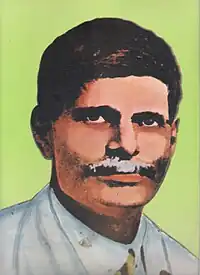Raghupathi Venkaiah Naidu | |
|---|---|
 | |
| Born | 15 October 1869 |
| Died | 15 March 1941 (aged 71) |
| Occupations | |
| Children | Raghupathi Surya Prakash |
| Relatives | Raghupathi Venkataratnam Naidu (brother) |
Raghupathi Venkaiah Naidu (15 October 1869 – 15 March 1941), was an Indian filmmaker, photographer, graphic artist, educationist and entrepreneur considered as the father of Telugu cinema.[1][2] Regarded as one of the pioneers of Indian cinema, Naidu started his career as a commercial photographer in Madras; he was drawn into independent filmmaking, and he traveled to different regions in South east Asia to promote and teach cinematic techniques, filmmaking, and distribute foreign language silent films.[1][3][4]
Venkaiah Naidu was the younger brother of Raghupathi Venkataratnam Naidu, an illustrious social reformer and educationist of modern Andhra.[5] Venkaiah founded one of the first cinematograph companies in South India called "The Glass Studio" equipped with sound-on-disc display technology, allowing play back sound in sync with a motion picture.[4][2] In 1912, he founded The Gaiety movie theater which was the first in Madras to screen films on a full-time basis.[6] The Raghupati Venkaiah Award is an annual award incorporated into the state Nandi Awards honoring veteran artists who made significant contributions in Telugu cinema.[7]
Biography
Early life
Venkaiah Naidu was born in a Kapu family[8][9] as the second son of an Indian Army official Subedar Appayya Naidu in Machilipatnam, British India.[1] His older brother Raghupathi Venkataratnam Naidu was a noted educationalist and social reformer.[4][5] His ancestors worked as Commanders in the Army of the East India Company and Madras Army in Hyderabad Regiments. At the age of 18, he moved to Madras and started drawing pictures and carving sculptures at Mount Road and selling them. He then learned photography and founded a photographic studio.[4]
Photographer
In 1909, he introduced Chrono Mega phone, equipment that relates sounds with pictures, from John Dickinson and Company. To pay for the Chrono Mega phone he bought for ₹30,000, he rented out his photo studio. He shot 12 short films and exhibited them in Victoria Public Hall. He also travelled to Bangalore, Vijayawada, Sri Lanka, Rangoon and Pegu to exhibit his films.[10]
Theatre owner
In 1910, he established Esplanade Ten House to exhibit his films. In 1912, he constructed Gaiety Talkies on Mount Road, the first Indian-owned cinema theatre in Chennai. He later constructed Crown Theatre on Mint Street and Globe Theatre in Purasawakkam, Madras. He also exhibited American and British films. Some of the first movies shown in his theatres were Million Dollar Mystery, Mysteries of Meera, Clutching Hand, Broken Coin, Raja's casket, Peral fish, and 'Great Bard'. He established a film library and provided training on cinematic techniques.[4]
Film producer
In 1919, he started a production company called Star of East Films and a film studio called Glass Studio. He sent his son, Raghupathi Surya Prakash Naidu, to study cinematography in London. Father and son made their first movie "Meenakshi Kalyanam" around actual locations of the Madurai Meenakshi temple. Later, they produced films like Gajendra Moksham, Mathsyavatharam, Nandanaar, and Bhishma Pratigna, the first Telugu mookie (i.e., movie with no playback voices).[11] He faced high competition with East India Film Company, and went bankrupt. Later, his son and Yaragudipati Varada Rao established a long-lasting precedent of focusing exclusively on religious themes; Nandanar, Gajendra Moksham, and Matsyavatar, three of their most noted productions, centered on religious figures, parables, and morals.[12] Venkaiah died on 15 March 1941 due to medical illness.[1]
Personal life
Devika, a popular actress in Telugu and Tamil films in the 1960s, was the grand-daughter of Venkaiah Naidu. Devika's daughter, Kanaka is also an actress.[13]
Filmography
- Meenakshi Kalyanam
- Gajendra Moksham
- Mathsyavatharam
- Nandanaar
- Bhishma Pratigya (1921)
In popular culture
A biographical film on Naidu titled Raghupathi Venkaiah Naidu was released in November 2019. Naresh played the title role of Venkaiah Naidu.[14]
See also
References
- 1 2 3 4 "Telugu film industry turns 80". @businessline. Retrieved 20 November 2019.
- 1 2 India, The Hans (7 November 2019). "Naresh plays Raghupathi Venkaiah Naidu". www.thehansindia.com. Retrieved 20 November 2019.
- ↑ "తెలుగు సినిమాకు మార్గదర్శి రఘుపతి వెంకయ్య". Samayam Telugu (in Telugu). 15 October 2016. Retrieved 20 November 2019.
- 1 2 3 4 5 Chaitanya, Krishna (6 August 2012). "Raghupati Venkaiah Naidu: The man who started it all". Bharat Janani. Archived from the original on 17 August 2013. Retrieved 21 June 2013.
- 1 2 History and Culture of the Andhras. Komarraju Venkata Lakshmana Rau Vijnana Sarvaswa Sakha, Telugu University. 1995. p. 389. ISBN 978-81-86073-07-0.
- ↑ Visweswara Rao, Namala. "Telugu Cinema Celebrity – Raghupati Venkaiah Naidu". Idlebrain.com.
- ↑ "'Nijam cheppamantara, abaddham cheppamantara... '". The Hindu. Archived from the original on 29 May 2007. Retrieved 23 April 2007.
- ↑ M. L. Kantha Rao (July 1999), A Study of the Socio-Political Mobility of the Kapu Caste in Modern Andhra. University of Hyderabad. Chapter 6. p. 275–278. hdl:10603/25437
- ↑ Srinivas, S.V.. (2010). Making of a Peasant Industry: Telugu Cinema in the 1930s–1950s. Bioscope: South Asian Screen Studies. p. 173. 10.1177/097492761000100207.
- ↑ Kumar, Srikanth (26 June 2010). "Why AP Government named an award after Raghupathi Venkaiah Naidu". South Scope. Archived from the original on 29 October 2014. Retrieved 29 October 2014.
- ↑ "Raghupathi Venkaiah Naidu Movie Review {2.5}: Not well made" – via timesofindia.indiatimes.com.
- ↑ "History of Birth and Growth of Telugu Cinema (Part 3)". CineGoer.com. Archived from the original on 11 April 2007.
- ↑ "Going in search of a yesteryear star actress and what I learnt". The New Indian Express. 24 April 2023. Retrieved 13 May 2023.
- ↑ "Raghupathi Venkaiah Naidu Movie Review". The Times of India. ISSN 0971-8257. Retrieved 12 May 2023.